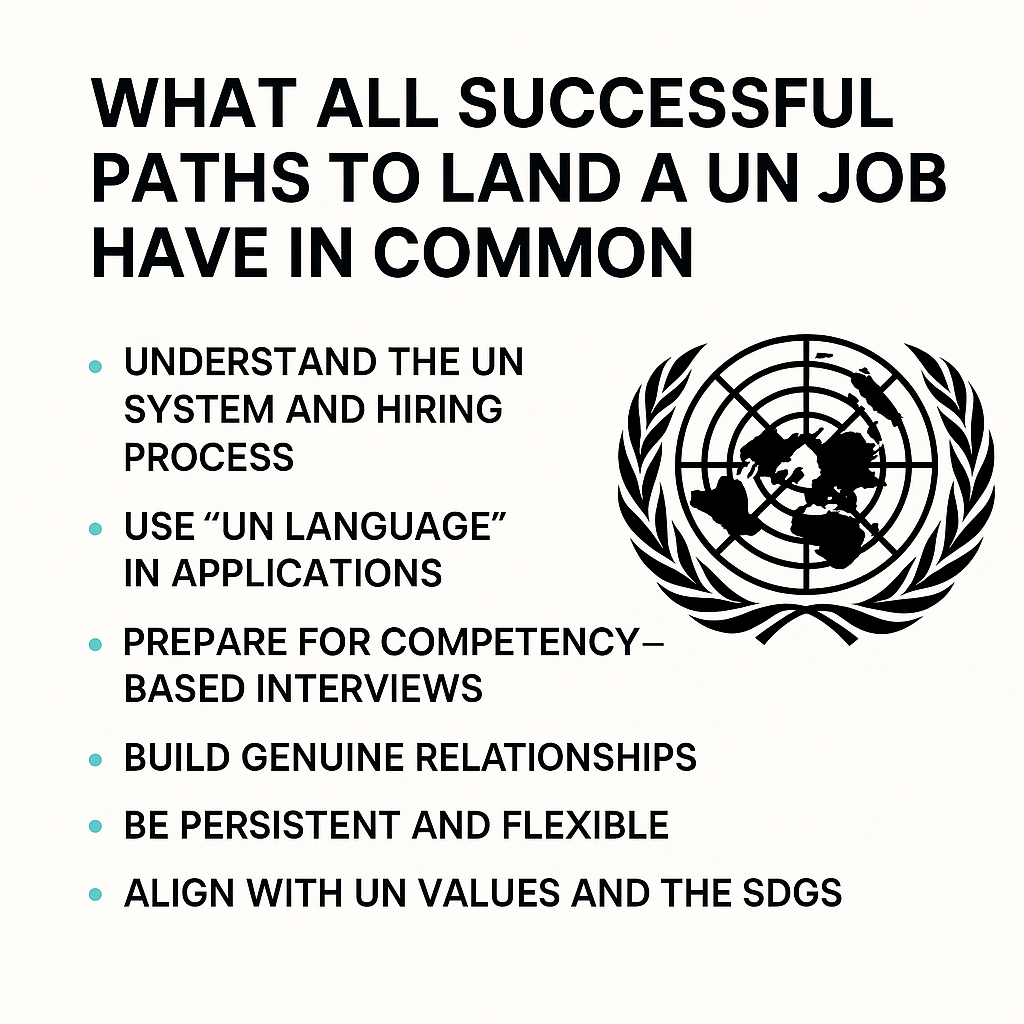What all successful paths to land a UN job have in common
What all successful UN job applicants have in common; how to start a United Nations Career
If you’ve ever wondered how to get a job at the United Nations, you’re not alone. Thousands of talented professionals from all around the world apply for UN jobs every year — but only a small percentage get through.
The good news? Whether someone entered the UN through an internship, the Junior Professional Officer (JPO) Programme, a direct application, or by networking, they tend to share some key habits and strategies.
Here’s what all successful UN job applicants have in common — and how you can use these insights to start your own career with the United Nations.
1️⃣ They educate themselves to understand the UN System and its hiring process
Every person who successfully landed a UN job first took time to study the system:
How the UN is structured (Secretariat, Funds, Programmes, Specialized Agencies)
Understand the different grades; what a P-level job means vs a consultancy or a National Professional Officer (NPO) role
How to create and submit a P11/PHP profile through UN Careers
How competency-based recruitment works
💡 Tip: Read the vacancy announcement carefully. Every duty and competency listed is a clue to what you must demonstrate in your application.
2️⃣ They use “UN Language” UN terminology and key words in their applications
One of the biggest mistakes new applicants make is using generic CV language.
Successful candidates tailor their P11 and cover letter using UN keywords and competency language, such as:
Planning and Organizing
Teamwork
Client Orientation
Accountability
Technological Awareness
They show measurable results:
Instead of “Managed a project,” they write:
“Coordinated multi-stakeholder programme implementation, ensuring on-time delivery and compliance with donor reporting requirements.”
This makes it easier for UN HR teams and screening systems to see a direct match.
3️⃣ They prepare for competency-based interviews
Whether through JPO exams, panel interviews, or written tests, successful applicants know to use the STAR method (Situation, Task, Action, Result).
Example:
Situation: Describe context clearly
Task: What was your responsibility
Action: Steps you took
Result: The measurable impact
Reflection (STAR+R): What you learned
They practice out loud and keep answers concise (1–2 minutes).
4️⃣ They build genuine relationships
Networking is not just “who you know” — it’s about building credibility and visibility.
People who landed their first UN job often:
Connected with UN professionals on LinkedIn
Attended webinars, conferences, or local UN events
Stayed in touch with colleagues from internships, volunteer work, or NGOs collaborating with UN agencies
When a vacancy opened, they already had a network who could guide them or alert them early.
5️⃣ They are persistent, professional and flexible
Most UN staff will tell you they were rejected many times before getting in.
Successful applicants:
Apply consistently
Stay open to consultancies, temporary assignments, or field duty stations
Keep refining their applications and learning from rejections
Persistence + strategy is the winning formula.
6️⃣ They align with UN Values and the SDGs
The UN looks for candidates who demonstrate commitment to its core values:
Integrity
Professionalism
Respect for Diversity
They also connect their personal mission to the Sustainable Development Goals (SDGs) — showing they are motivated by impact, not just a job title.
🚀 Your Next Step
If you’re ready to start your UN career, don’t leave it to chance.
💡 Book a 45-minute strategy call with a UN career expert through United Career Coalition to:
Get your P11 reviewed
Learn how to use UN language effectively
Practice interview questions and STAR answers
Build a personalized roadmap to land your first UN job
🔗 Our personalized writing support ensures your application is not only professionally formatted but also compelling, role-specific, and fully aligned with the UN’s tone, values, and expectations.
🔗 📅 Schedule a 45-minute video consultation with a UN expert today and get one step closer to the international career you’re striving for.

